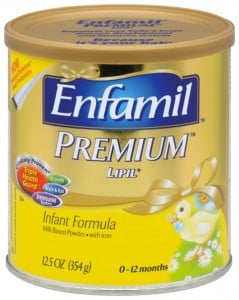
Nancy became concerned about the sugar content of infant formula shortly after her granddaughter switched from breast milk to formula. In just one short month, baby Kimberly shot up four whole pounds.
“We looked at all the formulas in the grocery store, even the store brand ones, and none of them listed the sugar grams per serving. None of them,” Nancy said.
So, like any concerned grandmother might do, Nancy called Enfamil, the company that manufactured her granddaughter’s formula to inquire about the sugar content.
Nancy was told by the company that they didn’t use any added sugar in their formula. But with corn syrup listed as the first ingredient on the label, Nancy wasn’t buying it. She wanted some straightforward answers. KPLCtv 7 was willing to help her get those answers.
Independent lab scientists at Deibel Laboratories tested seven of the most popular brands of infant formula. They tested for five different types of sugars and created a sugar profile on each formula brand, based on what they found.
Enfamil Premium and Parent’s Choice Premium both had the highest sugar content. Enfamil Premium measured in at 13.5 grams of sugar and Parent’s Choice measured in at 12.4 grams. But scientists revealed that the sugars found in these formula brands were actually the best kind – lactose, which is the same type of sugar found in breast milk.
Gerber Good Start, Similac Advance Complete and Enfamil Pro-Sobee tested very low for any type of sugar.
Things seemed to be going good so far, but then scientists found added sugars in two types of Similac formula.
Similac Advance Organic Complete Nutrition measured in at 3.5 grams of the sugar sucralose; one of the sweetest kinds of sugar. Similac Soy Infant Formula with Iron contained four different added sugars, including the super-sweet sucrose and it measured in at 3.8 grams of sugar. Both Similac formulas contained about the equivalent of a tablespoon of sugar per five ounces.
Enfamil and Parent’s Choice, both of which were found to contain only lactose, stated that they do not allow added sugars in their formulas because they are not found in breast milk. Similac, however, did not respond to questions asked about the sugar content of their formulas.
The International Formula Council pointed out that sucrose has been tested and found safe through clinical trials and through years of consumer use. Yet, there is a concern across the world when it comes to sucrose. The concern is so big that sucrose use in formula is banned in dozens of countries across the world, including Europe. What are those concerns? Childhood obesity.
Kevin Boyd, a pediatric dentist explains:
“We’re conditioning them to crave sweetness,” Boyd said. “I would say any formula that has sucrose, it’s super sweet, it makes the kid crave sugar. It triggers the release of dopamine in the brain, and it’s a comfort-level thing. It makes the kid want to eat more, so they become hypersensitive to sweetness.”
He says that some of these formulas are so sweet that they are more like “baby milkshakes.” And while not all of them have high amounts of sugar, those that contain added sugars are having a big impact on the future of children, even if that sugar content is low.
“If a child makes too many fat cells, they never go away. And they always want to be fed,” Boyd stated.
So how does the Food and Drug Administration in America feel about added sugar in formula?
They do have a lot of regulations on the production of infant formula. However, the FDA does not require that formula manufacturers list the amount of sugar per serving. Additionally, they have little to say about the amount of sugar allowed in formula.
Related Articles:
- Two Babies Die Within 6 Hours While Sleeping in Unsafe Environments
- Johnson & Johnson’s Recall Tylenol Due to Cap Defect
- Toy Fair 2012: New for Fisher-Price!







Not only is Similac the only formula that adds sugar..but they don’t add enough DHA! The recommendation is .2% and they are the only company that does not meet it. They would rather charge us the same as other products but not provide the same value..